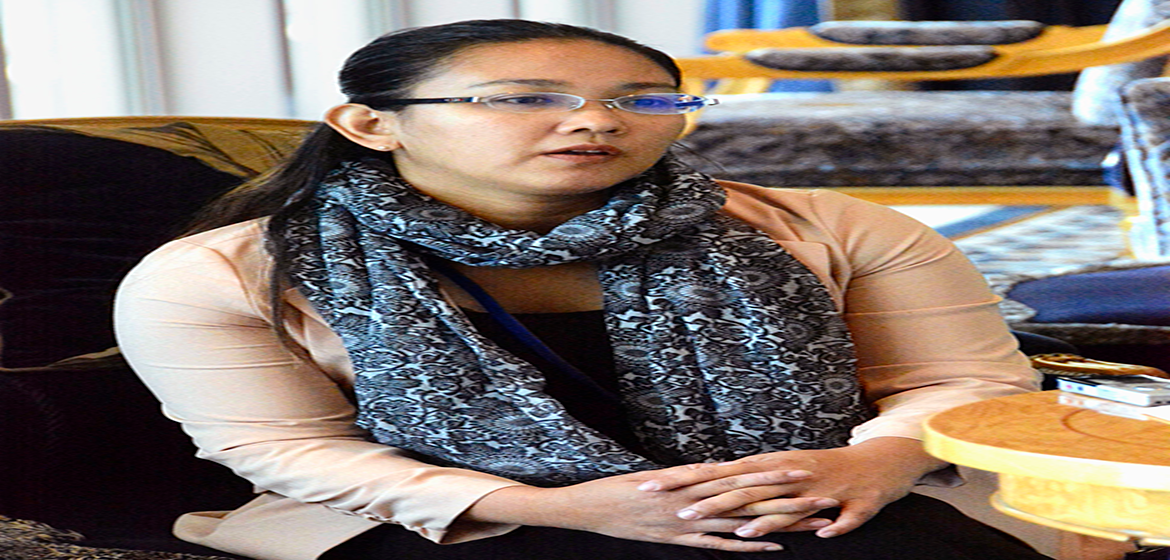NEW YORK – Activist Shinako Oyakawa recently used her first participation at a United Nations gathering in New York to highlight Okinawan issues in the context of a broader struggle for the rights of indigenous people around the world.
“We really have to make it an international issue because it is related to so many other indigenous peoples’ problems, and colonization is happening under the table,” she said on the sidelines of the international body’s 17th Permanent Forum on Indigenous Issues last month.
“Both the Japanese and U.S. governments are violently pushing through construction of new military bases at Henoko and Takae,” said the Ph.D. candidate at the University of the Ryukyus and executive member of the Association of Comprehensive Studies for Independence of the Lew Chewans.
In its official name, the pro-independence organization uses the original, local word for Ryukyuans — the indigenous descendants of the Ryukyu Kingdom, which was a sovereign entity prior to its annexation by Japan in 1879.
In recent years, the contentious relocation of U.S. Marine Corps Air Station Futenma from an urban center to the coastal area of Henoko has consistently drawn protesters, including last month when large numbers turned out to mark a year since the government started building seawalls to prepare for the transfer.
Further up the island’s east coast, residents of Takae have for the past decade staged sit-ins to oppose helipad construction for the U.S. military’s V-22 Osprey aircraft, whose noise and checkered safety record have heightened concerns.
“Our problem is about two different countries that are the colonizers, which makes it complicated,” Oyakawa said. “We are in the gap (between) two countries. We can’t agree (with either) and we are kind of excluded.”
Sharing the stage at a panel discussion with leaders from Myanmar, the Philippines and Malaysia, the Okinawa University lecturer pointed out that her homeland, despite representing only 0.6 percent of Japan by land area, bears a disproportionate burden in hosting U.S. military facilities.
Roughly 70 percent of the land area in Japan used for U.S. bases is in Okinawa. This presence, she said, has brought decades of accidents as well as cases of rape and murder.
“It’s not really a national issue,” she said. “It’s concentrated in Okinawa and the Japanese people don’t really face discrimination.”
Oyakawa, who is working on her doctorate in sociolinguistics, characterized the Ryukyu people as a “stateless minority” put through more than a century of subordination since falling under Japanese rule.
During World War II, the islands became a staging ground for a bloody land battle, with heavy civilian death tolls as residents got caught between U.S. and Japanese forces.
Okinawa was held by the United States for 27 years following the war, reverting back to Japanese control in 1972.
The government adopted a resolution in 2008 recognizing the Ainu population, mainly from Hokkaido and nearby areas, as an indigenous people with their own language and customs. However, no such designation has been granted to the people of Okinawa. At present, the government considers the Ryukyu language a dialect of Japanese.
In an April 19 plenary session during the U.N. forum, a representative of the Japanese mission stated that the government “respects Okinawa’s culture and traditions” but that “there is no widespread understanding in Japan that the people of Okinawa are indigenous people.”
At the same session, also attended by Oyakawa, a youth representative from her group aired their concerns. In addition to stating that “colonization and militarization (are) still severe,” she objected to the unfair burden the bases place on residents and demanded the return of human skeletons exhumed in the past for research purposes.
Separately, Oyakawa said that other groups are planning to file a lawsuit in the near future against the universities involved in collecting the remains, as previous efforts to resolve the issue have failed.
As the 37-year-old works to shine a global spotlight on Okinawan concerns, she has drawn inspiration and expertise from a variety of peers doing academic and advocacy work with indigenous groups around the world.
It was while studying at the University of Hawaii that she began to embrace her own heritage, with encouragement from residents. An exchange student at the time, Oyakawa shifted her academic focus to revitalizing the language of her grandparents, which she did not know, and later gained knowledge from Hawaiians about educating the next generation on indigenous issues.
While attending the School of Oriental and African Studies in London, she met Irish and Scottish students who expanded her thinking on independence efforts, and in more recent interactions with Yakutians, an indigenous group from Siberia, she learned new ways of cataloging documents to better track stolen artifacts.
Her trip to the United Nations provided an additional boost for her group, which Oyakawa said has many upcoming plans, including the possible formation of a charter school or after-school program where students can learn about indigenous culture and history.
“It is kind of new to go to the U.N., so we want to collect more information, learn how to use the information and we want to make a big network with indigenous people,” she added.
“We are still not equal and we are not really treated the same, so why not have our own view and make a partnership together?” she asked.
Source:
Related to SDG 10: Reduced inequalities and SDG 16: Peace, justice and strong institutions



